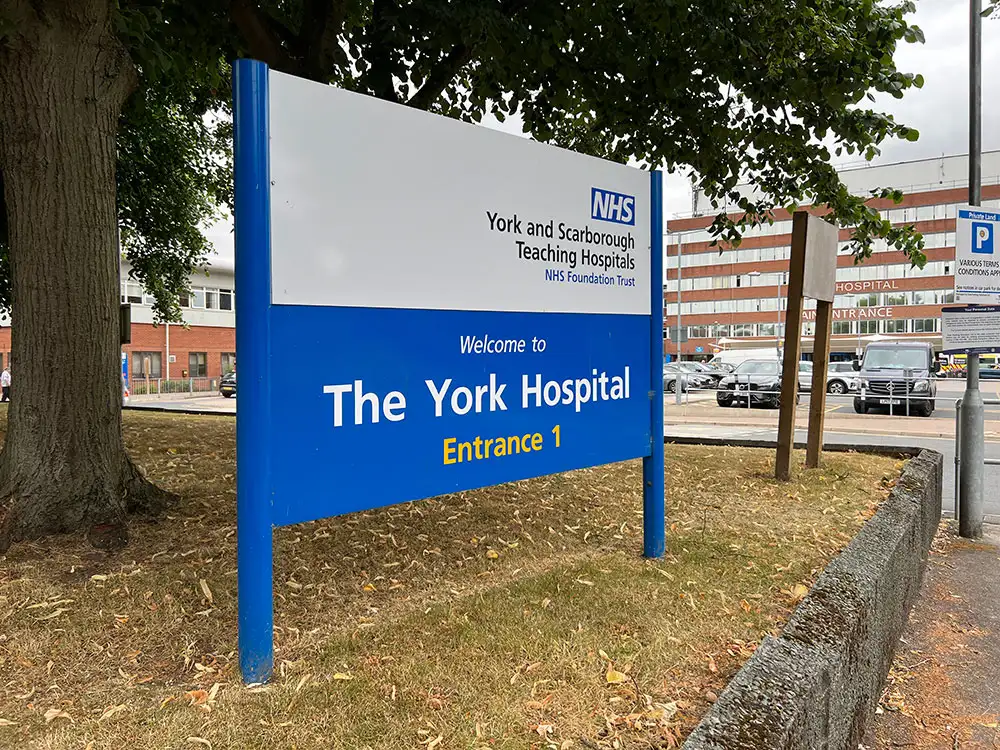A woman with MS who claimed a GP called her lazy after seeking help for fatigue is among those being let down by York health services, according to a watchdog.
Testimonies from women who felt dismissed, ignored and treated differently to men were among those in a York Healthwatch report.
Healthwatch York manager Siân Balsom said she hoped the report’s findings would help to inform efforts to make services better.
Michael Ash-McMahon, of the local NHS Integrated Care Board (ICB), said they knew health services for women were not good enough.
A York and Scarborough Teaching Hospitals NHS Foundation Trust spokesperson said they were continuing to work to ensure everyone receives safe, compassionate and consistent care.
The Healthwatch report is based on the experiences of women who accessed local medical services in the past 18 months.
Their testimonies cover issues including menstruation, pregnancy and menopause, along with the experiences of women with other physical and mental health conditions.
Poor experiences
Healthwatch stated it found while there was some good practice many women had had poor experiences.
The report stated women had highlighted the need for improved recognition of long-term health conditions.

It added there were also concerns around dismissive attitudes and a lack of consistent support.
Others raised issues around the handling of women’s mental health including with diagnoses.
Diana, who has MS, shared her experience with Healthwatch after going to see a GP about fatigue.
She said: “I was told I was lazy and had to do more exercise.”
Maggie, whose thyriod was affected after giving birth, said a male GP told her over the phone her headaches were just part of being a new mum.
She said: “I knew that wasn’t the case and I was feeling awful, I tried again and spoke to a female GP who recognised what was wrong and referred me to York Hospital.
“The consultant said it was lucky that I came in then as I had critical levels of hormones and needed immediate treatment.”
Caroline said she was told she was too young after phoning her GP practice and telling them she thought she was perimenopausal.
She said: “I rang the GP practice in tears, the receptionist just said I had to fill out a form.
“I asked my breast nurse, who I know due to a previous cancer diagnosis, she arranged a blood test which showed I am in fact perimenopausal but I still can’t get any feedback from my GP.”
Accused of ‘scamming’
Isla was misdiagnosed with BPD which she said led to her being put on medication until she was later diagnosed privately with complex post-traumatic stress disorder.
She added the misdiagnosis caused her issues when trying to access the health system.
Isla said: “I had a really bad experience with a GP, I went about a mental health
issue and he could see the diagnosis on the screen.

“He said: ‘I’m not going to help you, people like you are scamming the Government, claiming benefits.’
“I left in tears, my partner went in, and the receptionist said: ‘oh yes, that’s him, he’s bad with mental health, we’ll take him off the list of people you’ll see.’”
Jamie said she felt she had experienced anti-female bias after her and her husband had the same symptoms and went to the GP to see different doctors.
Jamie said: “He was told that it was difficult for him, I was told that this was usual for women and I should get over it.”
Positive experiences
The report also featured testimonies from women who said their experiences with the local health system were positive.
Donna, who went for a cervical smear, said: “My nurse put me at my ease and made a procedure which could be embarrassing and painful, very straightforward and easy.”
Georgia said gynaecology staff she had seen were brilliant.

Georgia said: “I was seen promptly and they were all lovely and provided excellent care.”
Leonie said she had received superb care after being diagnosed with breast cancer.
She said: “The nurses were kind, supportive and really great.”
Healthwatch’s recommendations include encouraging clinicians to improve their knowledge of long-term health conditions and raising awareness of tongue ties in newborn infants in response to some testimonials.
The body has also called for a mother and baby unit to be located within the Humber and North Yorkshire ICB area.
A review of the local pathway for women’s bone health and for clarity for women with Ehlers-Danlos syndrome and Postural orthostatic tachycardia syndrome (POTs) was also among Healthwatch recommendations.
The Leeds-based Yorkshire and Humber Mother and Baby Unit is set to expand from eight to 14 beds following a region-wide needs assessment.
Cllr Lucy Steels-Walshaw, health lead for City of York Council, said some of the report’s findings were depressing.
The Labour executive member said: “I had my first child 20 years ago and some of these things haven’t changed.”
Humber and North Yorkshire ICB interim Place Director Mr Ash-McMahon said there were sadly too many cases of women’s health not being taken seriously and concerns not being listened to.
The official said: “It is not good enough and we are determined to address this.
“While there has been some progress, we know there is still much to do.”
The York and Scarborough Trust’s spokesperson said they welcomed the findings of the report and the feedback from patients.
The spokesperson said: “While we acknowledge that some of the experiences described do not reflect the standard of care we aim to provide, it is encouraging to see positive experiences highlighted as well.
“We remain committed to delivering safe, high-quality care for women, babies, and families.”












